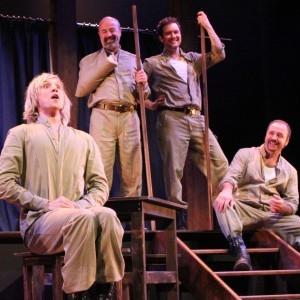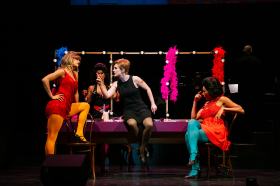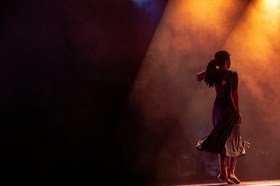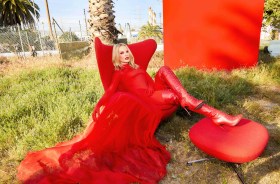In 1598, Richard Burbage and his players, The Chamberlain’s Men, demolished their old theatre on the north side of the Thames and carried the timber piecemeal across the river, to rise anew in Southwark, safely out of the puritanical jurisdiction of the city.
This bold move is echoed by the removal of the centre of Perth’s straight theatre from the old Playhouse to an ultra-modern new building on the other side of the tracks in Northbridge. Like Southwark in Tudor times, Northbridge is renowned as the city’s sinful quarter, awash with frolicking, fighting and fornication. Go to any largish city and you will find such a precinct; a place that carries an air of unpredictability, change and even danger, where the risky and risqué walk the streets hand in hand.
The risks for Burbage and his crew were great. First, they had to evade their grasping landlord, Giles Allen, by dismantling the old theatre while he was out of town. Then they had to raise money for the rebuild. Burbage persuaded his ten principal players, including Shakespeare, to become shareholders. For all of them, it was a chancy business.
Their risks echoed those of the political scene. There was talk of rebellion against the aging Queen Elizabeth I, and uprisings in Ireland proved impossible to put down. Robert Devereux, 2nd Earl of Essex, failed in this, as had his predecessors; then he added treason to his sins and was condemned to death. The players at the Globe were caught up in his plotting, and could well have lost their lives. It’s a good thing they didn’t, or we would have been deprived of some of Shakespeare’s finest plays.
John Aitken has taken these events, compressed them somewhat, and woven a masterful tapestry in dark shades with contrasting highlights, and here and there, a glimmer of gold. Themes of impermanence, insecurity and unreliability are underlined by constant suggestions of sexual ambiguity, which give rise to bawdy dialogue and sexually-charged business that would have done Shakespeare proud.
Director/designer John Senczuk is to be congratulated on the clever way he has choreographed some very difficult, even athletic, moves, and the cast is to be commended on their well-timed execution. The Enchanters is, in fact, a very clever play. Aitken has taken lines from many of the bard’s works and woven them into the dialogue. The drawback, of course, is that those lines will be wasted on audience members who are not Shakespeare geeks, but the bawdy business and the frequently athletic physicality of the action provide compensation for those who might miss some of the gags.
A highlight comes at the end of act one, when the players present scenes from Henry V to the accompaniment of muffled drums that gradually increase in volume and tempo. On a semi-darkened stage with a primary red backlighting, the resulting ambience is eerily threatening.
The all-male cast was well chosen. Richard Mellick, an experienced actor, writer and director, and Nick Maclaine, in his first professional role, played Burbage and Shakespeare respectively. They were perfect foils for each other. Nick Candy and Andrew Hale, as the rival comics Robert Armin and William Kempe, ably represented the new and the old masks on the changing face of theatre.
Two juveniles, David McLeod and Sam Tye, carried their roles as boy actors with considerable aplomb. They were not easy roles, either – they had a lot of lines (this play depends, like those of Shakespeare, on words, words, words) and the responsibility of encapsulating the motif of uncertain sexuality that is such an important vehicle for the play’s major themes. This was echoed by the ambiguity of the relationship between the Earl of Southampton (portrayed by a handsomely dissolute Cody Fern) and Shakespeare himself.
We glimpse other actors in the troupe: Ian Toyne as the spokesman Augustine Phillips and Ethan Tomas as William Sly brought powerful emotional and physical prowess respectively to their roles. John Pratt made a convincing Robert Cecil and John Aitken, the playwright himself, gave us an imposing Chief Justice. Much-loved veteran Edgar Metcalfe demonstrated enormous versatility, to say nothing of a flair for quick changes, as he dodged back and forth between Queen Elizabeth and Second Carpenter. (The First Carpenter, in case you’re wondering, was ably doubled by young Sam Tye, who at 15 is already a seasoned actor.) Andrew Hale likewise played two contrasting roles as William Kempe and the ill- fated Earl of Essex, bringing considerable emotional strength to two disenfranchised characters, both of whom might be seen as representing the passing of the old guard.
The set was simple, as befits a play set in Tudor times, and the costumes – basically military fatigues for the actors with more elaborate embellishments for the aristocratic roles – adequately reinforced the feelings of threat and dissolution inherent in the plot. Metcalfe frocked up beautifully for his red-wigged, white-leaded Queen Elizabeth, and there was some amusing high camp fun from the boy actors, looking suitably uncomfortable in their drag scenes. Plenty of high jinks and not a little music (directed by Ian Westrip) also feature in the production.
A few anachronistic words – for example, ‘medieval’ and ‘sadist’ – jarred, but it’s possible these were deliberately included to increase the feeling of no-ground-beneath-our-feet that permeates the play. Hints of sadomasochism involving Robert Cecil and one of the boy players were unresolved at the end, a thread that hung loose in the wind. One wonders why it was included at all. But these are small gripes. Overall, The Enchanters is a fine play, well worthy of wider exposure. It is to be hoped that this excellent production will not be confined to Perth.
The new State Theatre, by the way, has been worth the wait. The acoustics, while not perfect, (lines delivered upstage tend to get lost) are very good. The stage lights well and the seats are comfortable. From my seat in centre stalls I had excellent sightlines. Some more conventional seating in the foyer would be an improvement: sadly it is not possible to sit down face to face for a conversation over a drink. When you get to my age, such things are important.
The Prickly Pear Ensemble presents
The Enchanters
Written by John Aitken
Directed and designed by John Senczuk
Lighting Design by Trent Suidgeest
Sound designer James Luscombe
Cast includes Richard Mellick, Nick Maclaine, Nick Candy and Andrew Hale
State Theatre Centre of WA
May 31 – June 4
WHAT THE OTHER CRITICS SAID
The West Australian: “The Enchanters is well served by some strong performances. Nick Maclaine overplays at times, especially early, but generally delivers a convincing portrayal of the ambitious, astute and masterful man Shakespeare undoubtedly was.”






